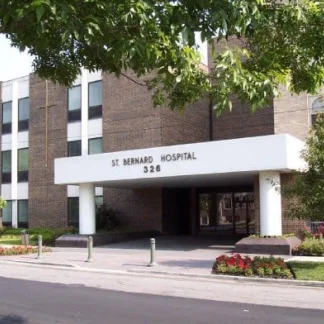WestCare - Cook County Jail IMPACT Program
WestCare - Cook County Jail IMPACT Program is a therapeutic community that provi...
Saint Bernard Hospital - Behavioral Health offers inpatient treatment for individuals needing behavioral health services. The program includes individual counseling, assessment, medical detox and more. Saint Bernard Hospital - Behavioral Health is located at Chicago, Illinois.
Illness, stress, anxiety and substance abuse can all contribute to behavioral health issues. St. Bernard’s team of psychiatrists have the expertise to diagnose a wide range of mental health issues in adults and put them on the road to recovery.
Charity, compassion and a commitment to quality guide St. Bernard Hospital’s mission to bring the best medical care to its patients. As a community hospital founded by the Religious Hospitallers of St. Joseph, they’ve met the unique health care needs of Chicago’s Englewood neighborhood for more than a century.
They’ve achieved their high level of quality through a number of programs designed to keep patients safe and improve their health outcomes. St. Bernard uses an electronic documentation system to track patients’ test results, diagnoses and prescriptions in real time, and computers in each inpatient room make accessing vital information quick and easy. Their safety measures include barcode-enabled bedside medication verification.
Contact us for more information: (773) 962-3900

Connect with Saint Bernard Hospital - Behavioral Health by calling their admissions team directly.
(773) 962-3900 Website Get DirectionsThe Joint Commission, formerly known as JCAHO, is a nonprofit organization that accredits rehab organizations and programs. Founded in 1951, the Joint Commision's mission is to improve the quality of patient care and demonstrating the quality of patient care.
Joint Commission Accreditation: Yes
Dialectical Behavior Therapy (DBT) is a modified form of Cognitive Behavioral Therapy (CBT), a treatment designed to help people understand and ultimately affect the relationship between their thoughts, feelings, and behaviors. DBT is often used for individuals who struggle with self-harm behaviors, such as self-mutilation (cutting) and suicidal thoughts, urges, or attempts. It has been proven clinically effective for those who struggle with out-of-control emotions and mental health illnesses like Borderline Personality Disorder.
Group therapy is any therapeutic work that happens in a group (not one-on-one). There are a number of different group therapy modalities, including support groups, experiential therapy, psycho-education, and more. Group therapy involves treatment as well as processing interaction between group members.
In individual therapy, a patient meets one-on-one with a trained psychologist or counselor. Therapy is a pivotal part of effective substance abuse treatment, as it often covers root causes of addiction, including challenges faced by the patient in their social, family, and work/school life.
Trauma therapy addresses traumatic incidents from a client's past that are likely affecting their present-day experience. Trauma is often one of the primary triggers and potential causes of addiction, and can stem from child sexual abuse, domestic violence, having a parent with a mental illness, losing one or both parents at a young age, teenage or adult sexual assault, or any number of other factors. The purpose of trauma therapy is to allow a patient to process trauma and move through and past it, with the help of trained and compassionate mental health professionals.
Group therapy is any therapeutic work that happens in a group (not one-on-one). There are a number of different group therapy modalities, including support groups, experiential therapy, psycho-education, and more. Group therapy involves treatment as well as processing interaction between group members.
In individual therapy, a patient meets one-on-one with a trained psychologist or counselor. Therapy is a pivotal part of effective substance abuse treatment, as it often covers root causes of addiction, including challenges faced by the patient in their social, family, and work/school life.
Trauma therapy addresses traumatic incidents from a client's past that are likely affecting their present-day experience. Trauma is often one of the primary triggers and potential causes of addiction, and can stem from child sexual abuse, domestic violence, having a parent with a mental illness, losing one or both parents at a young age, teenage or adult sexual assault, or any number of other factors. The purpose of trauma therapy is to allow a patient to process trauma and move through and past it, with the help of trained and compassionate mental health professionals.
In individual therapy, a patient meets one-on-one with a trained psychologist or counselor. Therapy is a pivotal part of effective substance abuse treatment, as it often covers root causes of addiction, including challenges faced by the patient in their social, family, and work/school life.
Trauma therapy addresses traumatic incidents from a client's past that are likely affecting their present-day experience. Trauma is often one of the primary triggers and potential causes of addiction, and can stem from child sexual abuse, domestic violence, having a parent with a mental illness, losing one or both parents at a young age, teenage or adult sexual assault, or any number of other factors. The purpose of trauma therapy is to allow a patient to process trauma and move through and past it, with the help of trained and compassionate mental health professionals.
Trauma therapy addresses traumatic incidents from a client's past that are likely affecting their present-day experience. Trauma is often one of the primary triggers and potential causes of addiction, and can stem from child sexual abuse, domestic violence, having a parent with a mental illness, losing one or both parents at a young age, teenage or adult sexual assault, or any number of other factors. The purpose of trauma therapy is to allow a patient to process trauma and move through and past it, with the help of trained and compassionate mental health professionals.
WestCare - Cook County Jail IMPACT Program is a therapeutic community that provi...
Advance Counseling Services is a private counseling clinic located in Chicago, I...
Uptown DUI Services is a private rehab located in Chicago, Illinois. Uptown DUI ...
NuWay Community Services is a private rehab located in Chicago, Illinois. NuWay ...